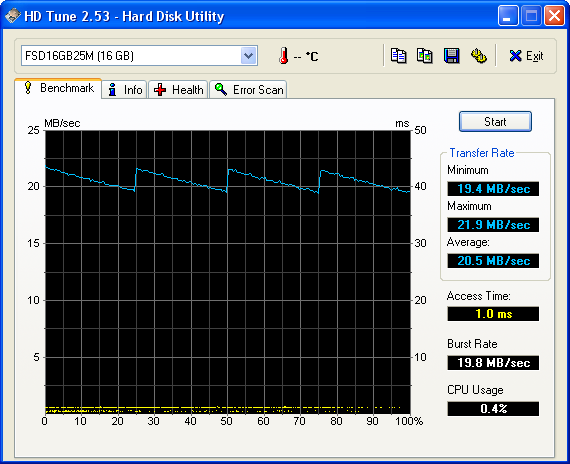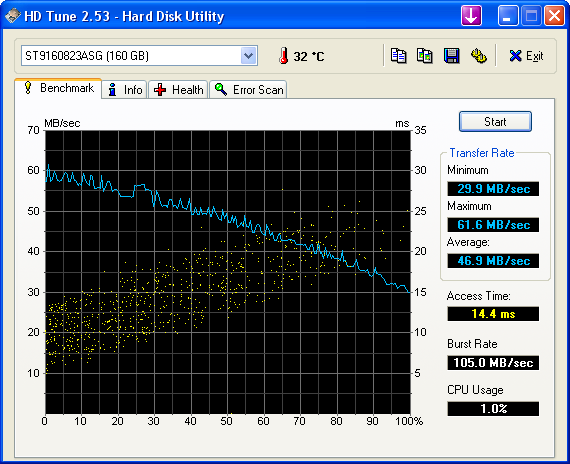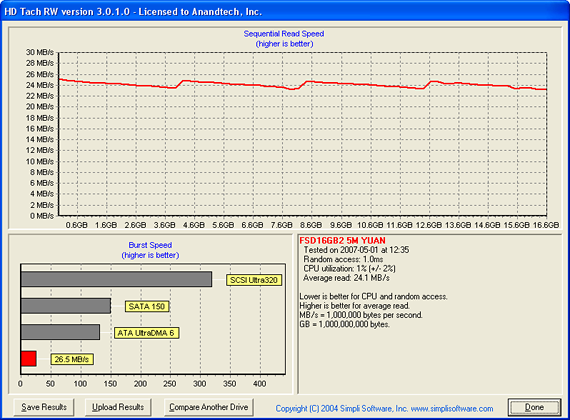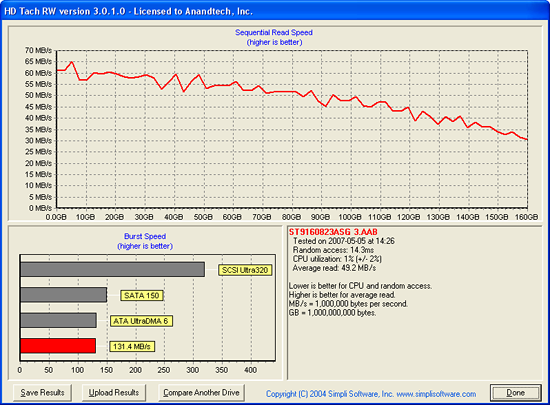Super Talent SSD: 16GB of Solid State Goodness
by Gary Key on May 7, 2007 4:00 AM EST- Posted in
- Storage
Hard Disk Performance: HD Tune 2.53


Our first screenshot is the Super Talent 16GB drive and indicates an average transfer rate of 20.5 MB/sec which is slightly lower than our HD Tach results below. The drive features an outstanding access time of 1ms or lower which greatly assists in random read times. The lack of higher sustained or maximum transfer rates will adversely affect the drives performance in most of our write tests but we must temper our performance expectations. The applications this drive is designed to run will not necessarily require high write or read speeds although they generally will respond well to the low access times. The second screenshot is the Seagate Momentus 7200.2 drive and is shown for reference only.
Hard Disk Performance: HD Tach 3.0


We are also including HD Tach results for review. Once again the order of the screenshots is the same as in our HD Tune results. In this benchmark we see a sustained transfer rate of 24.1MB/sec which is in line with the 25 MB/sec rating of the drive. Also burst rates are at 26.5 MB/sec which is close to the maximum throughput rating of 28 MB/sec from Super Talent. Super Talent is still tuning the flash controller, but HD Tach is already hitting the advertised ratings - HD Tach and HD Tune report MiB/s while drives are rated in MB/s, so we must remember the MB vs. MiB difference; 24.1 MiB/s is actually 25.3 MB/s.


Our first screenshot is the Super Talent 16GB drive and indicates an average transfer rate of 20.5 MB/sec which is slightly lower than our HD Tach results below. The drive features an outstanding access time of 1ms or lower which greatly assists in random read times. The lack of higher sustained or maximum transfer rates will adversely affect the drives performance in most of our write tests but we must temper our performance expectations. The applications this drive is designed to run will not necessarily require high write or read speeds although they generally will respond well to the low access times. The second screenshot is the Seagate Momentus 7200.2 drive and is shown for reference only.
Hard Disk Performance: HD Tach 3.0


We are also including HD Tach results for review. Once again the order of the screenshots is the same as in our HD Tune results. In this benchmark we see a sustained transfer rate of 24.1MB/sec which is in line with the 25 MB/sec rating of the drive. Also burst rates are at 26.5 MB/sec which is close to the maximum throughput rating of 28 MB/sec from Super Talent. Super Talent is still tuning the flash controller, but HD Tach is already hitting the advertised ratings - HD Tach and HD Tune report MiB/s while drives are rated in MB/s, so we must remember the MB vs. MiB difference; 24.1 MiB/s is actually 25.3 MB/s.










44 Comments
View All Comments
JarredWalton - Monday, May 7, 2007 - link
The 100,000 writes is per sector (or whatever the flash block sizes are) of the drive, so even if you're generating thousands of writes per day if the writes are all going to different blocks it becomes much less of an issue. That's what the "proprietary wear leveling algorithms along with built in EDD/EDC functions to ensure excellent data integrity over the course of the drive's lifespan" are supposed to address.Unless you are intentionally rewriting a single location repeatedly, I don't doubt that the drives can last 10 years. Considering I have a lot of normal hard drives fail within five years, that's not too bad. Besides, with the rate of progress it's likely that in the future SSDs will get replaced every couple of years just like today's HDDs.
PandaBear - Thursday, May 10, 2007 - link
With wear leveling, it doesn't matter where you write, it is internally mapped to different physical location each time, so it is 100k write per sector x # of sectors = total # of write you can get out of the entire drive.In this case, a bigger drive buy you more than just space, it buys you extra blocks/sectors that it can cycle through and reduce the wear on every single drives.
Reflex - Monday, May 7, 2007 - link
[quote]That's what the "proprietary wear leveling algorithms along with built in EDD/EDC functions to ensure excellent data integrity over the course of the drive's lifespan" are supposed to address.[/quote]Just to address this specifically, there is no such thing as a 'standard wear leveling algorithm', every flash producer has thier own method of wear leveling, so by default they are all proprietary. I am relatively certain that this company has not come up with something so revolutionary that it would essentially change the entire market as you seem to be implying, if they have I am pretty certain these flash chips would be the industry standard by now. Furthermore, were it any more advanced than the competition, it would not be advertised with a 100k write limitation when the industry standard is 250k writes.
Reflex - Monday, May 7, 2007 - link
I am very aware of how it works. However write operations can happen across several sectors. Once again, consider the market these are intended for. You will NOT get ten years out of one on a typical workstation, it simply will not happen. You will get at least a decade out of one as part of a cash register, assembly line robot, or other industrial/embedded purpose, which is what their statement is all about.You are likely to get one to two years out of one of these, tops. Furthermore, when it fails it will be sudden, and you will not be able to recover your data through conventional means.
I highly suggest you test this before you reccomend your readers to use these things as a main drive. I have tested it extensively myself as part of my job. My email is in my profile if you feel the urge to contact me about this.